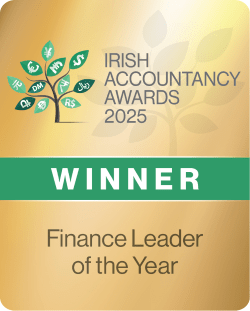Value-Added Tax (VAT) is a tax payable on the sales of goods or services within Member States of the EU. VAT is ultimately payable by the final consumer, and VAT-registered businesses are collectors. Businesses can reclaim VAT charged to them by suppliers as appropriate when they submit VAT returns to Revenue.
As a business owner, once you’ve completed VAT registration in Ireland, you become obliged to charge customers VAT on the products and services you sell. VAT-registered businesses also need to account for VAT in their VAT returns and must pay VAT liability to Revenue on a regular basis.
VAT can be tricky for some because there are a number of different VAT rules and guidelines, especially if you are charging VAT to customers in Ireland, EU countries, and internationally.
What is the VAT registration threshold in Ireland?
VAT payments are obligatory when your turnover exceeds the VAT threshold. If your turnover is less than the VAT threshold limit, you may register for VAT voluntarily. The VAT taxable turnover thresholds are:
- €37,500 for the sale of services or €75,000 over the course of 12 months;
- Businesses or persons who are in receipt of goods from other EU countries over the value of €41,000 (known as Intra-Community Acquisitions)
- Businesses or persons who are in receipt of any services from outside Ireland.
Not everyone whose turnover exceeds the threshold limit is required to register for VAT. Your turnover figure may be reduced by the amount of VAT paid on stock bought for resale, e.g., your business has a turnover of €85,0000 and has incurred €11,900 in VAT on stock purchased for resale. Once you subtract that amount of VAT from the €85,000, you will have €73,100 in adjusted turnover, which is below the registration limit of €75,000, which means you are exempt and do not have to register for VAT at this time.
New businesses don’t need to register for VAT directly after incorporation, with a few exceptions. Both a sole trader and a limited company can become VAT-registered businesses, so small businesses aren’t necessarily VAT exempt.
Voluntary VAT registration
You can become a VAT-registered business voluntarily if you are paying VAT to several businesses, even if your annual turnover doesn’t exceed the VAT registration threshold. The disadvantage is that you will become responsible for filing a bi-monthly VAT return to Revenue, but there are a few advantages. For one, you can claim the VAT back that has been paid on your business purchases, and you can add VAT to your products or services from the start instead of changing pricing later on in the process. It’s a good idea to approach a reliable accountant for professional advice when considering voluntary registration.
How Do I Register For VAT Ireland?
To become VAT registered in Ireland, you will need to complete a VAT registration form and submit it to Revenue. You may need to provide evidence that you trade with Ireland before you can register for VAT. Revenue may accept or reject your application based on the evidence you’ve submitted. Rejection doesn’t necessarily mean you’ll never receive your VAT registration certificate – you can reapply at a later stage once you’ve gathered the necessary documentation. You can register for VAT online through the Revenue Online Service (ROS).

You may need to provide evidence of trading activity in Ireland, including invoices from Irish suppliers and customers, proof that the business owner or director lives in Ireland, or that you have a physical office in Ireland. Virtual offices are not accepted.
Once HM Revenue has received your application to register for VAT, it can take up to 28 days to receive your VAT registration number if Revenue doesn’t have any queries. Queries must be addressed within 30 days, but it’s important to address issues as quickly as possible.
Goods that are supplied cross-border to final consumers may mean that you are eligible to register for vat OSS (One Stop Shop) or VAT IOSS, which means you only need to register for vat in a single country where sales are made, and not all countries. As always, there are exceptions to the rule.
How Do I Charge VAT as a VAT registered company?
There are several different VAT rates in Ireland. The standard rate for VAT is 23%, and most businesses that do not fall into the reduced rate categories charge VAT at this rate.
A reduced rate of 13.5% VAT applies to tourism-related activities and a few other businesses (restaurants, cinemas, building services, photography, etc.). Newspapers and electronic newspapers are charged a special 9% rate. Livestock-related activities and sales are charged 4.8% under the agricultural flat rate scheme, e.g., the sale of poultry and the hire of horses.
Exports, tea, coffee, milk, bread, books, and children’s clothing and shoes, as well as oral medicine, are VAT-exempt goods. Providers of these items charge 0% VAT and can claim VAT on their purchases. Some financial, medical, and educational providers are also VAT exempt.
When you sell goods, VAT is charged on top of the usual sales price. The consumer pays the VAT, and you are required to report and pay HMRC accordingly. If you are a B2B business, you can apply for zero-rate VAT on the supply to other businesses with a VAT number.
How Do I Account for VAT In Ireland?
There are two bases for accounting for VAT in Ireland: invoice and cash. If you are using the invoice basis of accounting, you must account for VAT when you issue the invoice to your customer. This could lead to you making advance payments before customers settle their accounts. The cash accounting scheme or receipts basis means you can wait until payment is received before you pay VAT to Revenue. If you are VAT registered, and your turnover doesn’t exceed €2 million in annual VAT taxable turnover, and 90% of your customers are not registered for VAT or entitled to claim a VAT refund or deduction, you can use the cash basis of accounting.
As always, there are complexities when you register for vat, recover the VAT, apply for VAT exception, or even account for VAT in your books. It’s important to understand VAT and how it can benefit your business before your VAT registration application has even been filed, whether you are a new business or have been around for decades.
Fortunately, there are consultants and accounting software packages that make handling your VAT obligations a breeze. Speak to Around Finance if you need advice or assistance.











